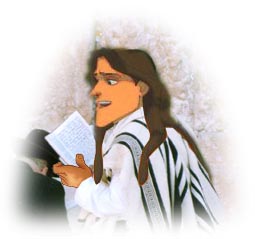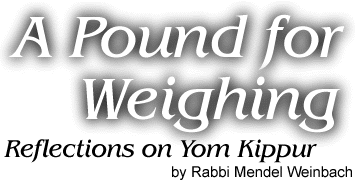A Pound for Weighing
 |  |
Pounding one's chest conjures up memories of jungle king Tarzan demonstrating his primitive sense of macho.
But if chest-beating is viewed as a sign of masculine strength in the secular world, it is appreciated as a sign of human weakness in the Jewish world.
Throughout Yom Kippur a Jew pounds his chest as he confesses his sins before his Creator on the day when his judgment is sealed. Once right before the Fast Day begins, and five times throughout the night and day of Yom Kippur, the Jew recites his long list of sins, each of which is accompanied by a fist striking at the heart
Teshuva — repentance and return — is comprised of regret for past sin, resolution for the future and a verbal admission of the sin. All of these ingredients are readily understandable as being indispensable elements for genuine return to G-d. But why is it necessary to pound the chest while making that admission of guilt?
The answer can perhaps be found in the dialogue between Iyov (Job) and the friends who came to console him for the loss of his children, his health and his fortune which Heaven had inflicted on him as a trial of his faith in G-d. On the verge of total despair, Iyov presented an argument that attempted, says the Talmud (Bava Batra 16), to free all of mankind from responsibility for their sins. The evil inclination which G-d created to challenge man in his use of his free will is so powerful, argued Iyov, that man is as helpless in being a sinner as an animal with uncloven hooves is in being not kosher for consumption. To this, his consolers responded that G-d had indeed created a powerful poison to persuade man to sin, but He also created an equally powerful antidote called Torah. Man could therefore not blame his Creator for his own failures to meet the challenges to his free will.
Iyov's futile effort at self justification echoes throughout the generations. It is heard in the international courtrooms from defendants on trial for crimes against mankind who plead they were helpless because they were only obeying orders in perpetrating their atrocities. It is heard in local courtrooms where a glib lawyer pleads for his criminal client on the grounds that his crime was not the product of any evil in him, but rather the result of a problematic childhood, corrupting environment or economic despair.
It is also heard in the privacy of our hearts whenever we feel too weak to overcome temptation or to admit our sin in failing to do so. How many times have we heard ourselves and others say "That's the way I am!" "I'm only human!" when backed against the wall with criticism of our behavior?
This is why a Jew pounds upon his heart, home of the evil inclination and the good one, as if to say "You caused me to sin!" The Jew who is courageous enough to confess his sin is actually admitting that he cannot "pass the buck" of responsibility to the Creator, but rather declares that "the buck stops here!" At this moment of truth he avoids putting all the blame for his shortcomings on his parents, his teachers, his neighbors and friends and admits he is ultimately the guilty party. In the same heart and mind where lurks the poison of the evil inclination there is available the good one which obedience to Torah can activate as an antidote.
The repentant Jew pounds on his heart as he imagines the Heavenly Court weighing his virtues against his faults on this Day of Judgment. He knows that each pound will help to tip the scale in behalf of a favorable judgment for a good year to come.






